Related Research Articles
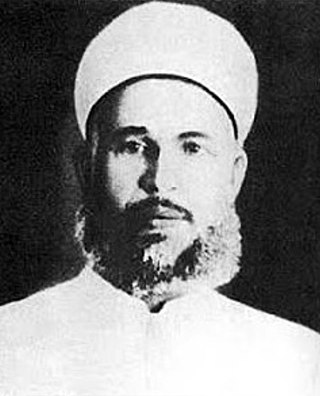
ʿIzz ad-Dīn ibn Abd al-Qāder ibn Mustafā ibn Yūsuf ibn Muhammad al-Qassām was a Syrian Muslim preacher, and a leader in the local struggles against British and French Mandatory rule in the Levant, and a militant opponent of Zionism in the 1920s and 1930s.

Ghassan Fayiz Kanafani was a prominent Palestinian author and politician, considered to be a leading novelist of his generation and one of the Arab world's leading Palestinian writers. Kanafani's works have been translated into more than 17 languages.
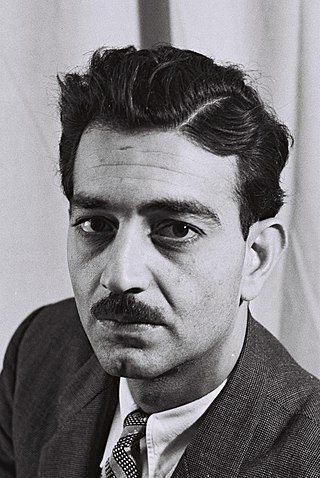
Emile Shukri Habibi was a Palestinian-Israeli writer of Arabic literature and a politician who served as a member of the Knesset for the communist parties Maki and Rakah.
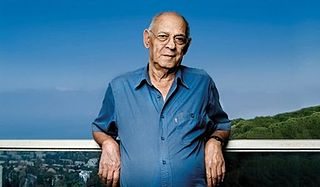
Sami Michael was an Israeli author, having migrated from Iraq to Israel at the age of 23. From 2001, Michael was the President of The Association for Civil Rights in Israel (ACRI).

Samīħ al-Qāsim al Kaissy was a Palestinian poet with Israeli citizenship whose work is well known throughout the Arab world. He was born in Transjordan and later lived in Mandatory Palestine and Israel. Before the Six-Day War in 1967 he was mainly influenced by Arab nationalism; after the war he joined the Israeli Communist Party.

Palestinian literature refers to the Arabic language novels, short stories and poems produced by Palestinians. Forming part of the broader genre of Arabic literature, contemporary Palestinian literature is often characterized by its heightened sense of irony and the exploration of existential themes and issues of identity. References to the subjects of resistance to occupation, exile, loss, and love and longing for homeland are also common.

Naziha Salim was an Iraqi artist, educator and author, described by the country's president, Jalal Talabani, as "the first Iraqi woman who anchored the pillars of Iraqi contemporary art".

Naziha Jawdet Ashgah al-Dulaimi was an early pioneer of the Iraqi feminist movement. She was a co-founder and the first president of the Iraqi Women's League, the first woman minister in modern Iraq history, and the first woman cabinet minister in the Arab world.
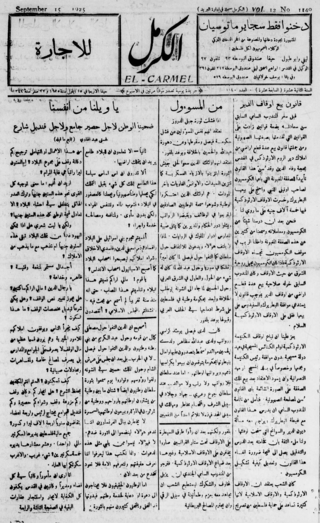
Al-Karmil or El-Carmel is a bi-weekly Arabic-language newspaper founded toward the end of Ottoman imperial rule in Palestine. Named for Mount Carmel in the Haifa district, the first issue was published in December 1908, with the stated purpose of "opposing Zionist colonization".

Shadia Mansour, also known as "the first lady of Arabic hip hop" is a British-Palestinian rapper who performs in Arabic and English. Much of her music revolves around Middle Eastern politics.
Syrian literature is modern fiction written or orally performed in Arabic by writers from Syria since the independence of the Syrian Arab Republic in 1946. It is part of the historically and geographically wider Arabic literature. Literary works by Syrian authors in the historical region of Syria since the Umayyad era are considered general Arabic literature. In its historical development since the beginnings of compilations of the Quran in the 7th century and later written records, the Arabic language has been considered a geographically comprehensive, standardized written language due to the religious or literary works written in classical Arabic. This sometimes differs considerably from the individual regionally spoken variants, such as Syrian, Egyptian or Moroccan spoken forms of Arabic.
Rosemary Sayigh is a British-born journalist and scholar of Middle Eastern history. She is known for her works on the Palestinian people, particularly those forcibly displaced to Lebanon as a result of the Nakba.

Safa Abdul-Aziz Khulusi was an Iraqi historian, novelist, poet, journalist and broadcaster. He is known for mediating between Arabic- and English-language cultures, and for his scholarship of modern Iraqi literature.

The Arab Socialist Ba'ath Party, also referred to as the pro-Iraqi Ba'ath movement, is a neo-Ba'athist political party which was headquartered in Baghdad, Iraq, until 2003. It is one of two parties which emerged from the 1966 split of the original Ba'ath Party.
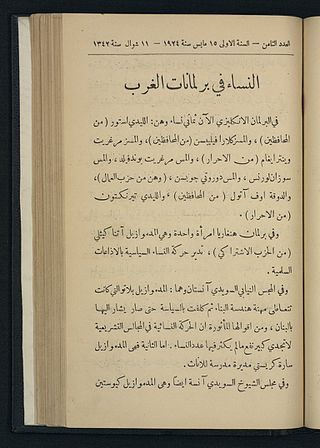
Layla was a first women's magazine published in Baghdad, Iraq, in 1923. It was published in the Arabic Language. The magazine which became the forerunner of the women's movement in Iraq ceased publication in 1925.
Samira Azzam was a Palestinian writer, broadcaster, and translator known for her collections of short stories. In 1948, Azzam fled Palestine with her husband and family in the Nakba. Her collections of stories are renowned for examining the entirety of the Palestinian identity during this time period. Her first set of short stories, Small Things, was published in 1954, and examined women's role in Palestinian society. After returning to Beirut in 1959, she examined other Palestinian social structures such as the class hierarchy. She published two more collections of short stories during her life, The Big Shadow and The Clock and the Man. Throughout her writing, she does not cast blame as to the cause of these social structures, but rather creates plot lines that characterize these different sub-cultures within Palestinian society, relating them to political situation of this historical period. Therefore, her writing creates a very holistic view of Palestinian national identity during this time in history.
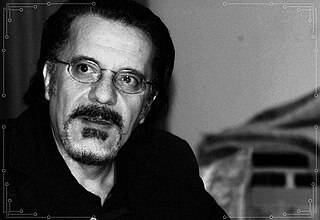
Jamal Hussein Ali is an Iraqi novelist and journalist born in Al Basrah, Iraq. He earned his doctorate (PhD) in Physics and Mathematics from Moscow State University (1993). He has published four novels, the most recent of which was Baghdad's Dead, as well as three collections of short stories and books about press release, literature and politics, both original works and translations. He has worked for several international and Arab newspapers. He has also won awards for stories, theater and journalism.
Zakia Ismael Hakki was an Iraqi Feyli Kurdish lawyer. She and Sabiha al-Shaykh Da'ud became the first female judges in Iraq respectively in 1956–1959. Hakki fled Iraq in 1996 after her husband was killed and was granted asylum in the United States. She returned to Iraq in 2003 and was elected to the National Assembly of Iraq and was an advisor in the drafting of the constitution.
Dalal Khalil Safadi was a Lebanese writer and translator. Considered a pioneer in the short story genre among Middle Eastern women, she was the first woman to publish a short story collection in Iraq.
References
- ↑ Women on a Journey Between Baghdad and London By Haifa Zangana. 10 January 2007. ISBN 978-0-292-71484-7. Archived from the original on 5 March 2022. Retrieved 19 August 2021.
- ↑ "Haifa Facts". stateofnature.org. Retrieved 27 August 2007.
- ↑ Zangana, H., City of Widows: An Iraqi Woman's Account of War and Resistance, [Author's Biographical Notes], Seven Stories Press, 2011 [E-book edition], n.p.
- 1 2 Zangana, H., City of Widows: An Iraqi Woman's Account of War and Resistance, [Author's Biographical Notes], Seven Stories Press, 2011; It may be worth noting that this book contains a detailed biographical sketch of the author's resistance activities not summarised here.
- ↑ Al-Hassan Golley, N., Arab Women's Lives Retold: Exploring Identity Through Writing, Syracuse University Press, 2007, pp 189-90; Abdel Nasser, T., Literary Autobiography and Arab National Struggles, Edinburgh University Press, 2017, [E-Book edition], n.p.
- ↑ "Questioning the New Imperial World Order" dead link as of 2021-08-19
- ↑ "Haifa Zangana | The Guardian". the Guardian. Retrieved 19 August 2021.
- ↑ Zangana, Haifa (17 August 2005). "Chewing on meaningless words". The Guardian. London. Retrieved 4 May 2010.
- ↑ Al-Hassan Golley, N., Arab Women's Lives Retold: Exploring Identity Through Writing, Syracuse University Press, 2007, p. 189
- ↑ Zangana, Haifa, ed. (2017). Party for Thaera: Palestinian women writing life. E-Kutub.
- ↑ Parr, Nora (27 March 2018). "Women's Nonfiction on Political Detention: From Iraq to Palestine". ArabLit & ArabLit Quarterly. Retrieved 19 August 2021.